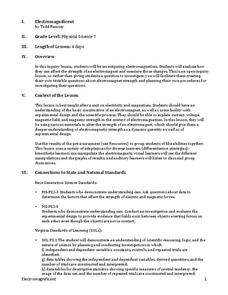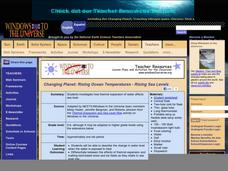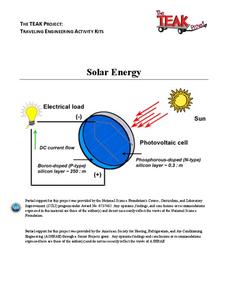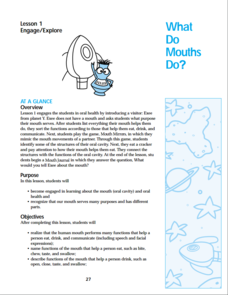Curated OER
Whodunnit?
Want to create an exciting mystery activity? Investigators will identify the elements of a mystery, review mystery stories, then write their own mysteries. They engage in forensic science experiments related to mysteries and learn to ask...
Curated OER
Hey - It's a Rainy Forest Out There!
Elementary schoolers take part in a very good lesson which has them watch video, conduct experiments, complete hands-on activities, and work in cooperative groups. The educationally-rich activities are clearly-explained, and the group...
Curated OER
Design Your Own Rollercoaster
Here is a physics lesson that your 5th graders should love. They explore the physics behind roller coasters by viewing roller coaster simulations online. Then, they work in pairs in order to design their own roller coasters and track....
Curated OER
The Importance of Making Labs a Priority
The benefits of inquiry-based exploration can be attained in any classroom.
STEM for Teachers
Electromagnificent
This physics pun really hertz, but this STEM lesson plan can help. The inquiry-based activity has young scientists create a testable question about electromagnetic strength; plan and implement their own experiments; and record and...
Curated OER
States Of Matter
Delv into the states of Matter. Students engage in the scientific inquiry process to uncover the exciting world of Matter. They watch a series of videos, and conduct experiments in order to collect and analyze data on the various state...
Curated OER
Changing Planet: Permafrost Gas Leak
Pair earth scientists up to use an amazing online arctic portal mapping tool and Google Earth to analyze permafrost changes. They compare changes to data on atmospheric concentrations of methane to see if there is a correlation. Then...
Curated OER
Changing Planet: Rising Ocean Temperatures - Rising Sea Levels
As an anticipatory set, young environmental technicians watch a video about how ocean temperatures seem to be changing along with the global climate. They perform a laboratory demonstration with the purpose of observing what happens to...
Curated OER
What are Igneous Rocks and How are They Formed?
Crystals form before your very eyes! What sixth grader wouldn't enjoy this lesson plan on igneous rock formation? Using hot Salol, junior geologists observe the crystal formation process as the material cools. This comprehensive lesson...
Curated OER
Wind Power
What a wonderful way to explore wind power! Through this lesson, learners get a background in the history of wind power, create their own wind turbine, and the test their designs. This is a terrific way to tie scientific principles to...
Curated OER
Suited for Space
A fantastic lesson on survival in outer space should excite your learners! Pupils explore the challenges that living, working, and surviving in space elicit. They focus on the spacesuit itself; how it protects astronauts, and enables...
Curated OER
Changing Planet: Black Carbon - a Dusty Situation
Introduce your young meteorologists to black carbon produced by the burning of fossil fuels by showing the video, "Changing Planet: Black Carbon." Viewers discover that deposition of this carbon on polar ice impacts the absorption of...
Curated OER
The Three Rock Groups
Firts graders distinguish between sedimentary, igneous, and metamorphic rocks. They group the rocks into the appropriate group. This is one of the best-organized plans I've seen! Learners watch a PowerPoint presentation which is embedded...
Curated OER
Seein' Double, Seein' Double
By using the Internet, hands-on activities, video, and cooperative learning, pupils look into the conditions in which light casts shadows on objects. The lesson includes fabulous hands-on activities, art projects, worksheets, and reource...
Curated OER
Autism and Autism Spectrum Disorders: Disorders Extending Beyond the "Norm"
Learners develop an understanding of autism by engaging in an inquiry-based discussion. Pupils are exposed to the vast array of defining characteristics of autism spectrum disorders. They create posters about the developmental...
Rochester Institute of Technology
Solar Energy
Warm up to the idea of solar energy. A lesson plan includes three activities that challenge scholars to apply knowledge in new ways. First, they learn to run an alarm clock without a battery by using solar energy. Next, they complete an...
Curated OER
Impulse, Momentum, and the Conservation of Momentum
What happens when two worlds collide? In the first of several activities, future physicists experiment with colliding ball bearings or Newton's cradle. Another activity requires the use of an air track with cars to examine collision....
Curated OER
Measures of Circular Motion
Physicists become Olympians in a competition using centripetal force. They ride a bicycle to comprehend relationships between linear and rotational motion. If you have an old-fashioned record player, it can be used to help pupils...
Curated OER
The Absorption of Solar Energy
Two sequential parts to this lesson introduce your class to the electromagnetic spectrum, the ability to absorb radiant energy, and the pigments in leaves that are responsible for collecting sunlight to be used in the photosynthetic...
National Institutes of Health
Open Wide and Trek Inside
Don't underestimate the value of a clean mouth! Here is a six-lesson unit that details everything a youngster needs to know about oral hygiene. It includes lessons on the purpose of a mouth and teeth, the nature of oral bacteria and the...
Curated OER
Earth Moon Scaling
A wonderful lesson incorporating math and physics skills along with specific details about the planetary bodies. The cross-curricular approach makes for a valid activity to challenge multiple ages and abilities. Your class could work in...
Curated OER
Habitat Basics
First graders get out and explore two different habitats to examine how each one meets the needs of the plants and animals that dwell there. They discuss what they've learned about animal habitats as they explore the outdoor environment....
Curated OER
Watershed Works: Unit 3
Geology whizzes observe the effects of change within a model of a watershed. They place replica waste dumps within the models and note the path that the waste takes as water passes through. This detailed lesson plan provides teacher...
Royal Society of Chemistry
Acids and Bases—Microscale Chemistry
Here's proof that small-scale labs lead to big-time learning. Introduce acid-base interactions to middle school scientists through a microscale chemistry lab. Pupils combine a variety of solutions and use indicators to obtain approximate...

























